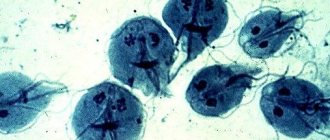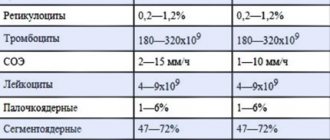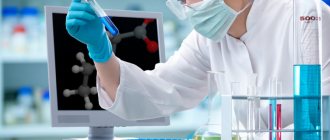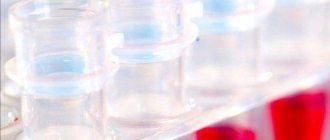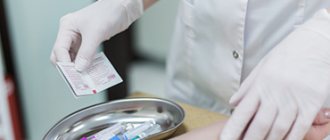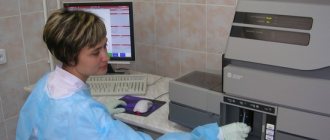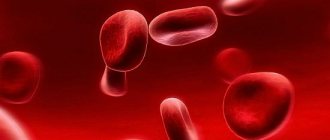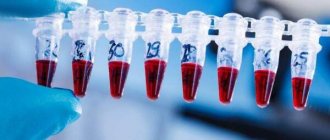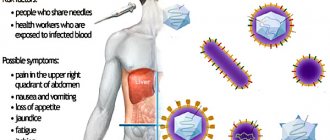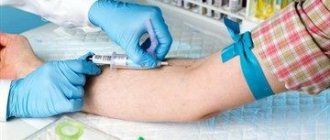Immunological research methods are modern diagnostic technologies based on the interaction of antigens and antibodies. This type of analysis is very accurate and informative.
They are used to identify immunodeficiency states of the body, autoimmune diseases and allergies, various infections and parasitic infestations, tumor antigens, and hormonal disorders. They are also used as an express method for accurately determining blood type and for determining pregnancy.
What are antibodies
Immunity plays an important role in protecting a person from environmental aggression.
When an antigen, a foreign agent, enters the body, antibodies begin to be produced in the blood.
Antibodies or immunoglobulins are specific proteins that are secreted by B lymphocytes. Their task is to eliminate exactly the “aggressor” that threatens the body at the moment. This means that they act selectively.
Antibodies, attaching to antigens, immobilize them, and at the same time signal to other cells - participants in the immune process, about the need to launch a reaction, and where exactly to direct it.
There is an immune memory for some past infections - antibodies to a specific antigen remain in the blood.
The presence or absence of a certain class of immunoglobulins can tell a lot about the state of the human body.
In total, there are five classes of immunoglobulins: G, A, M, D. Depending on their quantity and combination, one can judge the state of a person’s health and the nature of the disease.
Skin and other provocative tests
To determine allergies to allergen antigens, it is administered orally, by inhalation, or with a scarifier through the skin, and after 30 minutes immediate allergic reactions (IFRT) are checked, and after 1-2 days - delayed reactions (LLRT).
Immediate ones occur more often in response to food, pollen, and medications - in the form of redness and swelling. Slow ones - for bacteria.
The Mantoux test is performed to determine sensitization to MBT. Vaccination and infection rates are assessed. Tuberculin PPD is administered intradermally and with a + reaction, redness appears after 1-2 days. This indicates sensitization of the body. If the redness is more than 1 cm or there is no redness at all, this indicates TB.
Skin tests are used to identify immunodeficiencies and resistance to a particular infection, because a person throughout his life is exposed to antigens of common opportunistic bacteria and is sensitized to them.
Samples are taken with allergens of staphylo- and streptococci, E. coli, etc. There must be a positive reaction to at least one. If it is not present, this indicates immunodeficiency.
When is an immunological blood test prescribed?
An immunological blood test allows you to get a clear picture of the state of the body’s immune system, the presence of immunodeficiency, both congenital and acquired, and identify the presence and nature of chronic diseases.
Sometimes the immune system malfunctions and the body attacks itself (autoimmune diseases). They are also easy to detect using immunological serological testing.
This type of study is prescribed in the following cases if:
- the infectious disease is long-lasting and difficult to treat;
- there is a suspicion of congenital immunodeficiency;
- there is a possibility of acquired immunodeficiency, including that caused by HIV;
- autoimmune diseases are likely;
- allergic reactions are observed;
- there is a suspicion of oncological processes;
- complex surgical intervention is planned;
- it is necessary to determine the causes of male or female infertility;
- it is necessary to monitor the results of using hormonal drugs or immunosuppressants;
Using an immunological laboratory test, the following diseases can be diagnosed:
- immunodeficiency conditions, both congenital and acquired, including AIDS;
- autoimmune diseases: rheumatoid arthritis, systemic lupus erythematosus;
- diseases of the gastrointestinal tract;
- sexual infections;
- malignant neoplasms;
- diseases of the thyroid gland, disruption of its function;
- allergies with identification of allergens;
- toxoplasmosis;
- hepatitis B and C;
- herpes;
- Rhesus conflict between mother and fetus;
- candidiasis;
- cytomegalovirus infection;
- glomerulonephritis;
- myocarditis;
- osteomyelitis.
This is not a complete list of diagnoses; for final diagnosis, an immunogram is necessarily used as an additional method.
Autoimmune diseases
Lymphocytes are responsible for creating antibodies that block the action of microbes, infections and other pathogens. Some of them are nurse cells. Their task is to destroy the tissues of their own body during their pathological modification. Under the influence of certain factors, the system may fail. In this case, lymphocytes begin to attack healthy cells, starting the process of self-destruction of the body.
The reasons for their aggressive behavior can be internal and external. The first is heredity. Gene mutations can be passed on from generation to generation. Thus, if the ancestors suffered from any autoimmune disease, the likelihood of its occurrence is very high.
External reasons are:
- negative environmental impact;
- severe and protracted nature of the course of infectious diseases.
In addition, in some cases, lymphocytes cannot distinguish their own modified cells from pathogens and attack both.
There are many autoimmune diseases, the symptoms of which vary. Their only feature is their gradual development throughout a person’s life.
The most commonly diagnosed autoimmune pathologies are:
- rheumatoid arthritis;
- multiple sclerosis;
- type 1 diabetes mellitus;
- vasculitis;
- lupus erythematosus;
- pemphigus;
- Graves' thyroiditis;
- myasthenia gravis;
- scleroderma;
- antiphospholipid syndrome;
- Crohn's disease;
- glomerulonephritis;
- vitiligo;
- psoriasis;
- myocarditis, etc.
The list of autoimmune pathologies is very long. Without treatment, most of them pose a serious danger to both the health and life of the patient. Timely diagnosis is of great importance. An important role is played by the competence of the attending physician, who for many years may not suspect the presence of an autoimmune pathology. If he doubts the diagnosis, and alarming symptoms continue to bother him, it is recommended to contact other specialists and get his blood tested.
In the laboratory, during the research process, markers of autoimmune diseases are studied. If an increase in the level of any of them or several at once is detected, this indicates the development of pathology.
There are a great variety of markers for autoimmune diseases. Below are those whose concentrations do not correspond to the norm most often compared to others.
general description
The study of the immune system includes determining the cellular composition of the blood and determining the presence of antigens and antibodies in the blood serum.
At the 1st stage, the cellular composition of the blood is considered:
- total number of lymphocytes;
- ratio of T-lymphocytes and B-lymphocytes;
- phagocytic activity of neutrophils;
- lymphocyte apoptosis;
- productivity of B-lymphocytes based on the total number of immunoglobulins.
This study allows you to determine the general condition and strength of the immune system.
At the 2nd stage, the humoral activity of immune cells is examined:
- the concentration of cytokinins is determined;
- the quantity and ratio of types of immunoglobulins are measured;
When diagnosing specific diseases, the presence of an antigen or antibodies to it in the blood serum is determined.
Carrying out analysis
Blood sampling resembles a blood test for biochemistry - venous blood is taken in the morning on an empty stomach. The serum needed for RIA is then separated in the laboratory.
The work consists of several stages: the biomaterial is mixed with the required reagent; The labeled antigen is added in a certain amount so that it is possible to identify the part of the substance that has bound to the antibodies and the other part that will remain unbound.
- This mixture is incubated for several hours in a thermostat at a certain temperature.
- The free and bound radioactive material are then separated.
- And only then the study itself is carried out - radiometry of the samples is carried out using counters.
- The results are calculated and a special curve is constructed.
There are several research options.
The described variation is used for liquid-phase RIA, when all reagents are liquid.
There is also a solid-phase reaction. The antibodies are then placed in a liquid-insoluble carrier, such as polystyrene.
Another type is an immunoradiometric study. With it, antibodies are labeled with isotopes, not antigens. Antibodies and antigens are most often labeled with the iodine isotope 125I or 131, with a half-life of 60 days and high radioactivity. These isotopes are gamma-emitting. An AG-AT complex is revealed, where 1 of the components is labeled with an isotope. The reaction is counted by any change in radioactivity using b- or g-counters.
Although radioimmunoassay is sensitive and accurate, today it is gradually beginning to be replaced by safer methods - ELISA, for example, where there is no danger of working with radioactive isotopes. But when identifying drugs, hormones - steroid or peptide as antigens, RIA is widely used.
AT can also be adsorbed onto the solid phase (for example, polystyrene beads). The test material with its concentration of the studied AG is added to the complex. The labeled AG is displaced in direct proportion.
This displaced AG with its radioactivity is measured. It is also used to determine the concentration of unknown antigen.
Norms
Let's consider the main parameters of an immunological study.
Immunoglobulin A (IgA) is involved in the protective reaction of the mucous membranes of human organs. Exceeding the norm for this parameter may indicate:
- about arthritis;
- glomerulonephritis;
- multiple myeloma;
- inflammatory processes in the liver.
A deficiency of immunoglobulin A is observed:
- with cirrhosis of the liver;
- toxic conditions;
- radiation sickness
Immunoglobulin M (IgM) is released as an emergency response to antigen penetration.
Its quantity increases sharply:
- for viral or bacterial infections;
- parasitic infestations;
- autoimmune processes;
A decrease in the indicator occurs:
- in case of acute or cumulative poisoning;
- radiation sickness;
- taking immunosuppressants.
Immunoglobulin G (IgG) provides passive protection.
Excess of the indicator above the norm is detected:
- for rheumatoid arthritis;
- systemic lupus erythematosus;
- AIDS;
- multiple myeloma;
- chronic infectious diseases.
The indicator drops sharply:
- in case of poisoning;
- immunosuppressant therapy;
- radiation sickness;
- liver cirrhosis.
To identify allergic diseases, it is important to know the level of immunoglobulin E (IgE). A sharp increase in value occurs:
- with hay fever;
- hives;
- food allergies;
- the presence of parasites;
- allergies to medications.
A decrease in level indicates:
- about acquired viral and non-viral immunodeficiency;
- congenital immunodeficiency;
- taking immunosuppressants.
The immunogram itself is not a medical report and requires an experienced immunologist to decipher it.
Laboratory immunological examination for endogenous mental diseases
It is known that the functions of the nervous and immune systems are interconnected. In case of endogenous mental illnesses, deviations in the functioning of the immune system with activation of the immune system against autoantigens of the nervous system and/or suppression of certain mechanisms of the body's antimicrobial defense may be relevant. Both the state of immunity and infectious status are parameters that can be assessed qualitatively and quantitatively by laboratory methods.
Below on this page is the standard immunological examination plan adopted in our clinic. The treatment processes are also interconnected: restoring the functioning of the immune system in a “normal” mode usually has a beneficial effect on the course of the endogenous disease, and restoring the ability of the nervous system to overcome stress reactions, especially restoring the physiological structure of sleep, has a beneficial effect on the functioning of the immune system.
Our video “Endogenous mental disorders as autoimmune diseases”
An immunological examination should answer three main questions:
- Which processes in the immune system are weakened, and which ones work too actively and exhibit excessive autoimmune activity?
- The presence of an infection that suppresses the immune response and/or provokes autoimmune activity
- The presence of a “major” autoimmune disease with probable psychiatric manifestations, such as systemic lupus erythematosus.
These data will serve as the basis for your personalized treatment plan. Our standard immunological examination for endogenous mental illness
| Immunogram and autoimmune markers |
| IgA, IgM, IgG general |
| Level 1 immunological panel (general T cells, T helper cells, T cytotoxic lymphocytes, B cells, NK cells) |
| Naive/memory cells |
| B1 cells (CD19CD5) |
| General blood analysis |
| Protein fractions |
| Antibodies to cardiolipin IgA IgM IgG |
| ANF / Antinuclear factor |
| Rheumatoid factor |
| ASLO |
| SRB |
| HLA B27 |
| ACE activity |
| Indicator of damage to the blood-brain barrier |
| Protein S-100 |
| Borreliosis, neuroborreliosis |
| IgM to Borrelia - blood test |
| IgG to Borrelia - blood test |
| IgM and IgG immunochip for Borrelia garinii, Borrelia afzelii - blood test |
| Meningococcus |
| Blood test for antibodies to meningococcus - blood test |
| Listeriosis |
| Listeria antibodies - blood test |
| Herpes types 1 and 2, herpes type 6, Epstein-Barr virus, Cytomegalovirus, Varicella-Zoster virus |
| PCR from saliva biomaterial for Varicella-Zoster virus |
| PCR from saliva biomaterial for herpes simplex virus types 1 and 2 |
| PCR from saliva biomaterial for herpes type 6, Epstein-Barr virus, Cytomegalovirus |
| HIV. |
| Antibodies to human immunodeficiency virus (HIV) |
| Viral hepatitis B, C, G. |
| Blood by PCR for hepatitis C virus |
| Blood by PCR for hepatitis B virus |
| Blood by PCR for hepatitis G virus |
| Toxoplasmosis. |
| IgM to Toxoplasma |
| IgG avidity to Toxoplasma |
| Chlamydia and mycoplasma. |
| IgA antibodies to chlamydia trachomatis |
| IgA antibodies to chlamydia pneumonia |
| IgA antibodies to Mycoplasma pneumoniae |
| IgA antibodies to mycoplasma hominis |
| Syphilis |
| TPHA (RPHA) semi-quantitative method |
| Brucellosis |
| Antibodies to Brucella |
| Salmonellosis |
| Antibodies to Salmonella A, B, C, D, E |
| Shigellosis |
| Antibodies to Shigella |
| Yersiniosis |
| Antibodies to Yersinia |
| Bakposevy |
| Throat culture with determination of sensitivity to a standard set of antibiotics |
| Nasal culture with determination of sensitivity to a standard set of antibiotics |
| Urine culture with determination of sensitivity to a standard set of antibiotics |
Once the examination results are ready, it is advisable to consult an immunologist. In our clinic, in the case of endogenous mental illness, an immunologist works in partnership with a psychiatrist. Treatment in this mode is more consistent and comfortable.
Typical results of immunological examination in endogenous mental illness
It is important to exclude epilepsy and organic diseases of the central nervous system (multiple sclerosis, neuroinfection, consequences of head injury, vascular disorders, brain tumors, etc.).
Typically the examination plan is as follows:
- EEG (electroencephalography) routine (30 minutes). If epilepsy is suspected, a longer recording may be necessary (1.5 hours, daytime or nighttime EEG monitoring). Read more…
- MRI of the brain for increased intracranial pressure, multiple sclerosis and other organic diseases.
- Examination by an ophthalmologist to determine the condition of the fundus. Based on the picture of the fundus vessels, one can judge the state of the vessels of the entire brain, increased intracranial pressure, and venous stagnation.
- Ultrasound of cerebral vessels.
- Psychopathological testing.
- Examination by a neurologist.
- Examination by a psychiatrist.
Preparing for the study
Immunological studies are classified as serological (blood serum studies). This test uses venous blood taken on an empty stomach in the morning. In order for the results to be as reliable as possible, certain rules must be followed:
- Stop eating 12 hours before taking blood. You can only drink clean water.
- Three days before the test, avoid alcoholic beverages.
- Do not smoke for at least an hour before taking blood.
- Avoid solarium and X-ray examinations two days before;
- If possible, avoid stress the day before the diagnosis;
- Eliminate unhealthy foods (fried, smoked, salty, fatty) from the diet two days before taking blood.
- If there are no vital indications, exclude any medications, especially hormonal ones. If it is not possible to discontinue the medications, be sure to notify your doctor about taking them.
- Women should not have a test done during menstruation.
Important! Failure to follow these simple rules may distort diagnostic results.
